 Leading Blog | Posts by Month |
 Leading Blog | Posts by Month |
12.31.20

LeadershipNow 140: December 2020 Compilation
See more on
Posted by Michael McKinney at 05:31 AM
12.28.20

8 Steps to High Performance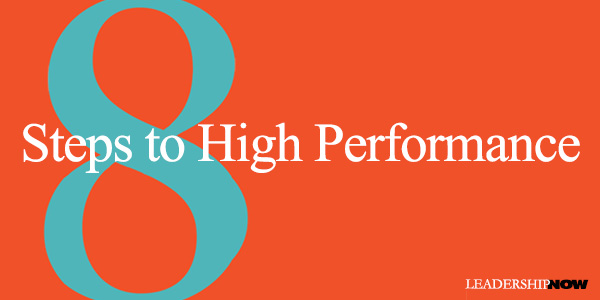
MARC EFFRON believes anyone can be a high performer. That is a person “who consistently delivers better results and behaviors, on an absolute and relative basis, than 75 percent of their peers.” In 8 Steps to High Performance, he identifies eight proven performance drivers that we have the ability to implement. Effron theorizes that each of us has factors that are the fixed 50 percent that affect our performance. They are things like our intelligence, core personality, and socioeconomic background. Some of these are genetic, and others are part of our environment growing up. (Which we can change if necessary as we grow older.) So it makes sense that we focus on practicing the things we can control that have the most impact on our performance. The other half, he calls the flexible 50 percent. These are things in your control, like how you set goals, behave, develop, network, present yourself, and manage your sleep. Most of these boil down to getting out of your own way. The 8 steps to high performance are: Step One: Set Big Goals. This step is, not surprisingly, critical. You can’t deliver big results if you don’t have big goals. And those goals should align with what matters most to the organization. “Bigger goals, focused on the right things, allow you to demonstrate higher performance. Bigger goals also test your capabilities and build self-confidence in your ability to deliver great results in the future. Since bigger goals are also more challenging to achieve, you’re forced to build new skills and capabilities to achieve them.” Step Two: Behave to Perform. You can control your behavior. Your behavior is what sets you apart, and it is what your boss and others you work with pay attention to. Effron shares some baseline behaviors that can help your performance—ability to connect, innovate, inspire, and model—and eleven behaviors that can derail your effectiveness like being excitable, skeptical, leisurely, bold, eccentric, a perfectionist. “High performers work hard to identify the most productive behaviors, learn new behaviors where needed, and stop showing the less helpful ones.” Step Three: Grow Yourself Faster. The more you grow, the better you can perform, and the more opportunities you will earn. Create a Personal Experience Map by asking experts in your field to identify the most meaningful experience for you to gain. “As working professionals, we grow our capabilities about 70 percent through our experiences, about 20 percent through others, and about 10 percent through formal learning.” Step Four: Connect. Build networks both inside and outside of work. “Those who connect more effectively have higher performance because they’re able to get more insights, favors, and answers from more people. And it’s almost entirely controllable by you.” Step Five: Maximize Your Fit. Continue to grow into the needs of your organization. “You’ll only stay a high performer if you adapt your capabilities and approach to what your company needs at the moment.” What does your company need for you to deliver? Step Six: Fake It. We manage impressions all the time. “As your career evolves, your continued high performance will require you to show new behaviors. How fast you adapt to these behaviors will help differentiate you as a high performer. Some of these behaviors won’t come naturally to you, and you may not be fully convinced they’re the right way to manage or to work.” Guess what? Growth is uncomfortable at first. Fake it until you get it right. Step Seven: Commit Your Body. “Your body plays a critical role in your performance; it’s important to eat right, exercise, and get enough sleep.” When it comes to sleep, quality is more important than quantity. Six and a half to seven hours is the sleep sweet spot. While studies seem to indicate that exercise matters a little and diet has no measurable effect on high performance, I think that may be short-sighted. And the two certainly play into long-term performance. It’s a package. Step Eight: Avoid Distractions. Effron dismisses many of today’s management ideas. And we do have to careful of the latest fads enlisting them as some sort of solution to all of our problems. He picks apart the strengths movement, emotional intelligence, 10,000 hours of practice, and growth mindset, among others. In the limited perspective he describes for each of them, he is right, but a thorough understanding of these concepts provides valuable insights for being a high performer. For example, emotional intelligence has very little to do with personality and is more about understanding your effect on others. Weaknesses need to be managed and often improved on, and a growth mindset is not about individual intelligence. Al of these ideas will help you increase your performance. When looking over the 8 steps, evaluate yourself on which ones you have mastered and which ones you need to work on. You might not be able to hit all of the steps but take those you need to work on, one at a time, and you will be headed in the right direction. 8 Steps to High Performance is quite valuable in showing you how to get out of your comfort zone to begin to contribute to your potential. Each chapter ends with a section called “What Can Get in the Way” that highlights some of the rationalizations and obstacles one might encounter in taking the next step in their development. 
Posted by Michael McKinney at 01:27 PM
12.24.20

Leading Thoughts for December 24, 2020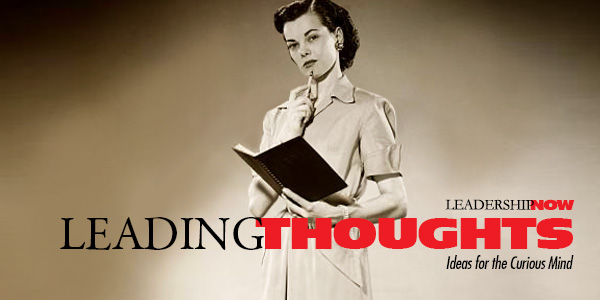
IDEAS shared have the power to expand perspectives, change thinking, and move lives. Here are two ideas for the curious mind to engage with: Nobel Prize winner in Physics, Frank Wilczek on the truth of science: “Science tells us many important things about how things are, but it does not pronounce how things should be, nor forbid us from imagining things that are not. Science contains beautiful ideas, but it does not exhaust beauty. It offers a uniquely fruitful way to understand the physical world, but it is not a complete guide to life.” Source: Fundamentals: Ten Keys to Reality Cistercian monk Michael Casey on the need to listen: “In the short term it is easier to interact by assuming a surface calm. Mostly we do not want to listen to pressures building up inside others; we prefer to hope they will muddle through, and (anyhow) we have enough worries on our own account. Perhaps the most necessary of all skills today is the timeless knack of being able to listen to others, allowing them to tell their story, knowing that telling it will ease their burden and help them become stronger.” Source: Toward God: The Ancient Wisdom of Western Prayer Look for these ideas every Thursday on the Leading Blog. Find more ideas on the LeadingThoughts index.
Posted by Michael McKinney at 10:23 AM
12.23.20

Acting with Power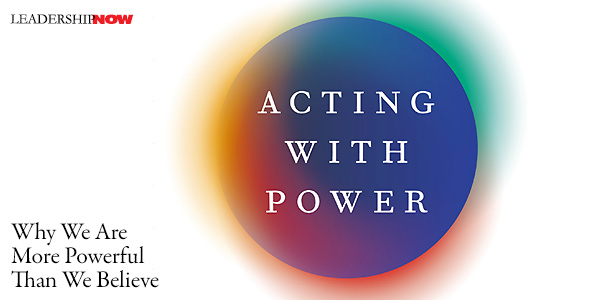
WE need to think about power differently. Deborah Gruenfeld has been teaching a class at Stanford University that is the title of her book, Acting with Power. It is a tour de force on what power is, how it works, and how it affects every aspect of our lives. We all have power. The question is, what are we doing with it? Two statements she makes at the start caught my attention immediately: Success, impact, and life satisfaction are not the result of how much power you can accumulate, or even how powerful others think you are; they are the result of what you are able to do for others with the power you already have. These two statements set the stage for what follows. What Is Power? Simply stated, “power is the capacity for social control.” On a more personal level. “what makes someone powerful—what makes others willing to comply with their wishes—is the degree to which they are needed. Any person’s power depends entirely on the context in which power is being negotiated.” Power is not a feeling, and if you have to talk about it, you probably have very little of it. We can play our power up, or we can play it down. Both can be useful depending on the context and how we do it. “Pulling rank can be generous, or an expression of caring, when done by the right person at the right time.” As we see over and over in this book, the motive is the key. Sometimes you need to “power up because there will be times when other people need you to behave this way in order to protect their interests.” It lets people know, “I’ve got this.” Knowing when to power up or down is important to managing balance in a given situation. Playing power down often helps you to connect with others and pull them in. “Playing power down is not showing weakness. It is showing that we are strong and secure enough to take personal risks and put others’ interests ahead of our own.” Getting Good at Being Who You Are In one of her most important and practical chapters, she talks about a much bandied and misunderstood idea—authenticity—being yourself. Too often, people get the idea the authenticity means doing whatever feels right to me because it’s who I am. I’m being real. Frequently, that will backfire. In everyday life, we are acting, presenting an image of who we are. Being yourself is an act. We strategically choose costumes and props, manners of speaking and moving, and even which stages to appear on, not to trick people into believing falsehoods about us but to define ourselves and express a stable, coherent identity that keeps us grounded psychologically as we grapple with the messiness, self-doubt, and confusion that are an inevitable part of the internal experience. When we behave any way we want, any time we want, we are losing the plot. We are connected to others playing a part in their stories as they do in ours. So, we need to always consider our role on the stage we are on. When we don’t, we fail the people who depend on us. Losing the plot, like “going rogue,” describes acting in a way that is inappropriate because it does not fit the context and violates social norms in a way that is not helpful to anyone. In life, as in the theatre, the plot is the premise; it refers to the story like, the part of the given circumstances that defines what the actors have agreed to come together to do, and how they have agreed to behave while doing it. Power as A Follower All of us are subordinate to someone. If we are to be good in a supporting role, we first have to get our thinking right about it. If we can’t thrive in a supporting role, it means we have lost the plot if we ever really understood it in the first place. Gruenfeld says it requires a different level of commitment and a willingness to put someone else first. Your contribution must come first without regard to recognition. “It signals clearly that you care more about the art than about being known as the artist.” Well put. People who know how to support and follow understand leadership better. What is fulfilling, in life, is to serve a higher purpose in roles where you can have real impact—not just the ones that look good on a resume. And then there are times when we need to step into a more powerful role. Usually, the people who want power the most, are the least qualified to exercise it. One of the great ironies of power is that we seek leading roles in order to feel more secure and more in control, but then the joke is on us: we find that the moment we step into a powerful position is the moment we realize how little control we actually have. The thread that runs through the abuse of power is insecurity. And we all have them. Because of that, when placed in positions of power, “people act more readily on all kinds of impulses and approach all kinds of rewards that satisfy personal needs and desires, in ways that make the most sense to them, with less concern for the social consequences of their actions.” We know bad actors when we see them, but unfortunately, we have few role models to show us what it should look like. Gruenfeld examines some of the various types of bad actors and how we can best respond to them. She suggests that we use a different standard when choosing leaders rather than the dominant individuals we typically associate with leadership. If we used beneficence — “the capacity in a high-power actor to prioritize the welfare of less powerful others” — then a different kind of men and women would rise to the top. This suggests that to create organizations in which power is used effectively, it may be useful to cast people who have shown not just that they are capable of rising quickly but also that they are interested in the quality of their performances and are willing to do their time in a low-level position in order to learn, to hone their expertise, and to contribute (repeatedly) to something they care about. 
Posted by Michael McKinney at 12:29 PM
12.18.20

What Do You Do When Life Ambushes You?
WE are conditioned to believe that to be happy, for life to be good, everything should be going our way. Life is supposed to be comfortable when done right. Most self-help books are based on this line of reasoning. But when you think about it, a constant state of comfort is numbing to the human spirit. It takes us nowhere. What really makes us feel alive are those times when we are challenged, pushed, distressed. In those moments, opportunities arise, our mind expands, and we grow—we learn. What do you do when life ambushes you? When you are disabused of the status quo. Times like this can either shut you down or open you up. Ambushes create a question. Former Navy Seal Jason Redman says when a life ambush— “a catastrophic series of events that knock the wind out of you, pin you to the pain, and forever alter your reality” —hits you, you must overcome. You must get off the X. The X is the event that hit you. And we can get stuck there—sometimes for years. He says people respond to life ambushes in three ways. They are destroyed by it and can’t stop rehashing it. Or, like most people, they get through to the other side, but it is always a struggle for them. Or the third group turns the ambush into a launching point. In Overcome: Crush Adversity with the Leadership Techniques of America's Toughest Warriors, he shares the story of he was caught in an ambush that left him severely wounded, almost losing an arm and half of his face shot off. He was caught on the X—the “kill zone, the point of attack” –bleeding out, sure he was going to die. He had to stay awake to stay alive. He had to overcome. What would you do? “How you handle a life ambush, how you handle any crisis, is dictated by how well you lead yourself, and how well you lead others.” After an ambush, you have to take back control of your life and move from defense to offense or what he calls the Overcome Mind-Set. “Self-discipline is the best way to take control of your life again after an ambush.” Your first move is to get off the X. Identify the issue and find a new direction. You have to REACT: Recognize your reality, Evaluate your position, Assess possible exit routes, Choose a direction and communicate it, and Take action. Moving is the key to getting off and staying off the X. Once you’ve been through a life ambush, it’s so easy to look back at where you were in the past and think, “Getting back there is my goal.” It isn’t. It can’t be. You have to figure out what your new 100 percent is and build on it. Redman believes there are five areas of your life that when maximized will help you to face any ambush when it comes. The key self-leadership areas are physical, mental, emotional, spiritual, and social.
Physical Leadership: “If you are ignoring your physical health, you’re in denial about the risks you are unnecessarily taking. Physical fitness is not just about being ripped or strong; it is about having the energy needed to lead. Physical fitness is the base. Everything is supported by this base.” Mental Leadership: “You build mental leadership through broadening your perspective, increasing your knowledge, and getting outside of your comfort zone. An interesting recommendation from the Brain Center was to find a sport that requires balance, like paddle boarding, surfing, or even cycling. These exercises are great for mental training because you are using the muscles on both sides of your body, causing your brain to use both hemispheres.” Emotional Leadership: “What we do with our emotions is a choice. We choose to allow ourselves to get angry and explode. We choose to verbally express our negative thoughts and frustration. Controlling our emotions begins by understanding the scope of our emotions and what patterns we typically fall into when we react.” Social Leadership: “Often in those hardest moments you only have your close friends and family, and if you did not take the time to nourish those relationships, you will be trying to overcome the near impossible, climbing out of a deep hole without a rope or assistance.” Spiritual Leadership: “Spiritual leadership means recognizing that you are a unique part of a much larger world and picture, and investing time and resources to make your community and world better. If you struggle with spiritual leadership, try a simple practice: gratitude. Gratitude forces you to look outside of yourself, to focus on something beyond your problems.” If you are not maintaining each of these five areas, you will undermine your ability to lead others. A Crisis Is a Launchpad Overcome offers an approach to get you off of your X with a never-quit attitude. It’s about breaking down the barriers in your mind and keep moving forward despite your fears. It’s about perspective and gratitude. A life ambush is miserable when we go through it. Maybe we don’t fully recover from it, but it creates a whole new path. So many people get stuck on what they lost or what they no longer have. They want the past so much that they’re not willing to turn around and look forward at what is in front of them. They fail to even consider, “Okay, what are my new opportunities, and could something better come of it.” Choose to overcome—very good advice from someone who walks the talk. 
Posted by Michael McKinney at 04:32 PM
12.17.20

Leading Thoughts for December 17, 2020
IDEAS shared have the power to expand perspectives, change thinking, and move lives. Here are two ideas for the curious mind to engage with: Margaret Heffernan on what it takes to make your predictions more thoughtful and accurate: “Ordinary people who were open-minded, educated, prepared to change their minds, humble, and attentive could gain real insight and awareness into what might happen in the next year or so. These were people who were prepared to see multiple, not single, causes of events and who were comfortable updating or changing their initial expectations.” Source: Uncharted: How to Navigate the Future George Schultz, who turned 100 on December 13th, on creating a learning environment: “I always have found that if I could create an environment around me in which everybody felt they were learning, I would have a hot group. I have always tried to include people in what I was doing, to encourage them to sat what they think, to let them see the problems that were confronting us all, and to create an atmosphere in which everyone could feel at the end of the day, or the end of a week or a month, that he or she had learned something.” Source: Turmoil and Triumph: My Years as Secretary of State Look for these ideas every Thursday on the Leading Blog. Find more ideas on the LeadingThoughts index.
Posted by Michael McKinney at 08:48 AM
12.15.20

Uncharted: How to Navigate the Future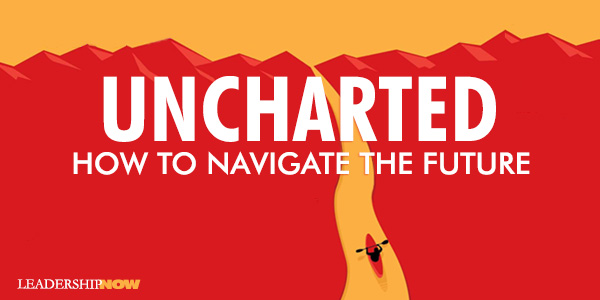
PREDICTION has never been easy – or that accurate. Over and over again, forecasts and models fail us. And when they do, they won’t go away because the agenda behind them lives on. As a model or a forecast is designed to do, we become “recruited into an army of believers.” “The more we believe, the less we question,” says Margaret Heffernan. In Uncharted: How to Navigate the Future, she writes that “Overwhelmed with complexity, we seek simplification and too quickly reach for binary perspectives, just at the moment when we need broader ones.” How true. We crave certainty in a world that remains ambiguous. In an outstanding first chapter—False Profits—she reviews the work of three economic forecasters and the shortcomings and consequences of each. Forecasts and models are useful if they get you thinking, but only if we see them for what they are—propaganda.
Our past informs our present and future, but it can’t predict it. History, especially our personal history, defines a trajectory and provides us with probabilities. It tells us how we tend to react to what life throws at us, but we also have the capacity to learn and grow and change. New experiences shape us.
Believing that his history always repeats itself can lead to “blindness and blunder.”
Much of what she is talking about here defines the year 2020. So, if we can’t predict the future, what can we do? First, we can experiment more. In a time of crisis, we need to know more. We need to experiment. Experiments are an “antidote to helplessness or passivity. They set us on paths that reveal new knowledge and choices.” We can develop scenarios to “identify and test how and where the future and the present meet.” Different from experiments that “reveal immediate internal features of a complex system, scenarios explore where the internal organization meets the external environment, where uncertainties lurk beyond anyone’s control.” Scenario planning always surfaces conflict and there is always a moment when everything seems to fall apart. But getting the conflict out in the open, constructively, is crucial; it’s how and when people start to acknowledge and consider alternative perspectives. Third, we need to think like an artist. Artists think for themselves. They pay attention. Notice more. And then they let it sit—simmer, filter, distill, digest. Then they act. The only way to know if you are on to something is to start. I liked the phrase: “moving in and out of focus, trying to get a feel for something that doesn’t exist yet.” To have insights that are relevant to life requires having a life, one rich in experiences, and the time to internalize them. Fourth, think beyond. Start a Cathedral Project. Cathedral projects are unpredictable from the beginning. “They are destined to last longer than a human lifetime, to adapt to changing tastes and technologies, to endure long into the future as symbols of faith and human imagination.” They are also full of experiments making them “intrinsically, ambiguous, uncertain, and full of risk.” They attract brilliant minds because “the scale of their aspiration ensures that, instead of being passive victims of the future, they are actively involved in making it.” Imagination, creativity, compassion, generosity, variety, meaning, faith, and courage: what makes the world unpredictable are the same strengths that make each of us unique and human. Accepting uncertainty means embracing these as robust talents to be used, not flaws to be eliminated. 
Posted by Michael McKinney at 05:11 PM
12.11.20

The Company I Keep: How Leonard Lauder Built Estée Lauder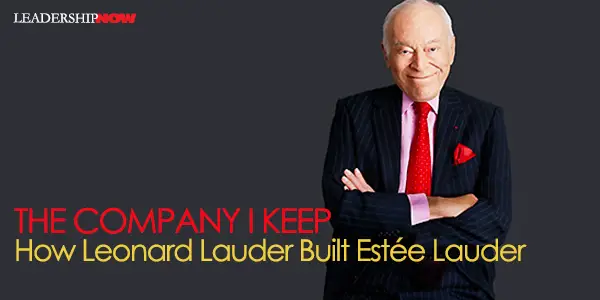
ESTÉE LAUDER founded what would become the Estée Lauder Corporation in 1933 on the conviction that “every woman can be beautiful.” Her ambition was to have a life filled with beautiful things, and that “rested entirely on her ability to sell her skincare products.” The first five chapters of The Company I Keep: My Life in Beauty are a must-read for any entrepreneur. Her son, Leonard, details the tenacity, business acumen, salesmanship, and mindset of a superstar businesswoman. Her Uncle John developed a face cream, and she began demonstrating it in high school. She wrote, “Deep inside, I knew I had found something that mattered much more than popularity. My future was being written in a jar of cream. My moment had come and I was not about to miss seizing it.” She pioneered the “sales technique of the century:” the free sample. No woman would ever leave empty-handed. Estée Lauder was built on the free sample.
My mother didn’t realize it at the time, but her insistence on personally training saleswomen would be a key differentiator when she eventually opened counters in department stores. Other brands used saleswomen to merely sell products; thanks to my mother’s training program, her salespeople taught customers how to use her products to look their best. Her hands-on approach—what her father had dismissed as “fiddling with other people’s faces” —was a charm. “Touch your customer and you’re halfway there,” she would preach. And she was a tenacious saleswoman even following New Yorkers who headed south to winter in Miami—staying for months. My mother stopped at nothing in order to inform every woman about her products so that she would tell more women. No one escaped. She stopped strangers on the street and on trains to give them beauty tips. She famously interrupted a Salvation Army sister’s bell-ringing to explain how she could make her skin look and feel fresher. “There’s no excuse for looking untidy,” she admonished. An acquaintance from those years remembered how my mother would approach someone she had never met before, evaluate her makeup, and proceed to tell her how to correct it. “She would end up selling her $40 worth of Cosmetics.” Leonard learned many lessons watching his mother, and his quest for excellence served him well during his time in the Navy. One of the greatest lessons he learned there was, “No matter how smart you think you are, there’s always someone who’s smarter. No matter how good you are, there’s always someone better. I would search out and hire exactly those people.” This belief, he says, would help play an enormous role in the growth Estée Lauder. And if he had to fire someone, he took responsibility. “Everyone has worth. The fact that we have no been able to take advantage of your skills is not your fault. It’s our fault.” He wanted to build Estée Lauder into the General Motors of the beauty business, “with multiple brands, multiple product lines, and multidimensional distribution.” The book is full of great lessons and the stories behind them. Here are some I pulled out. Positioning is the product. 
Posted by Michael McKinney at 02:12 PM
12.10.20

Leading Thoughts for December 10, 2020
IDEAS shared have the power to expand perspectives, change thinking, and move lives. Here are two ideas for the curious mind to engage with: Morgan Housel on finding the sensible balance between optimism and pessimism: “Optimism is usually defined as a belief that things will go well. But that’s incomplete. Sensible optimism is a belief that the odds are in your favor, and over time things will balance out to a good outcome even if what happens in between is filled with misery. And in fact you know it will be filled with misery. You can be optimistic that the long-term growth trajectory is up and to the right, but equally sure that the road between now and then is filled with landmines, and always will be. Those two things are not mutually exclusive. Source: The Psychology of Money Arthur Jensen on what brings out genius: “Genius requires giftedness (consisting essentially of some special aptitude or talent, such as mathematical, spatial, musical, or artistic talent). But obviously there are other antecedents that are elusive to us. Nonetheless, we do know of at least two key attributes, beyond ability, that appear to function as catalysts for the creation of that special class of behavioral products specifically indicative of genius. They are productivity and creativity.” Source: Giftedness and Genius: Crucial Differences found in Intellectual Talent: Psychometric and Social Issues Look for these ideas every Thursday on the Leading Blog. Find more ideas on the LeadingThoughts index.
Posted by Michael McKinney at 01:39 PM
12.07.20

The Best Leadership Books of 2020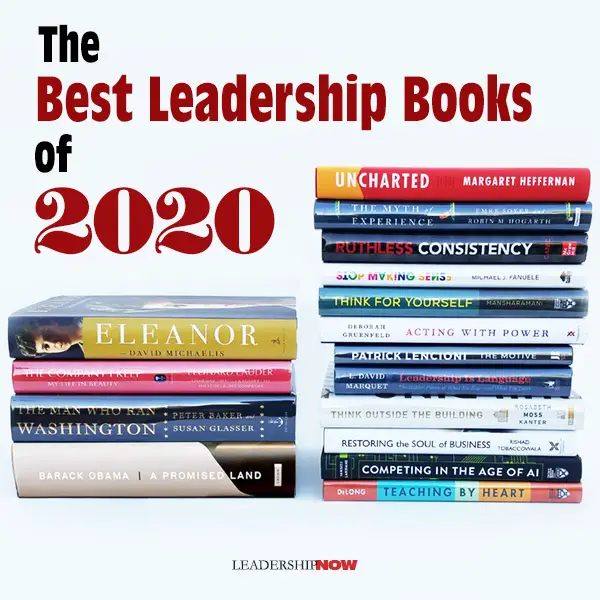
2020 has tested us. It has illuminated our strengths and exposed our vulnerabilities. It has called on us to reinvent and transform. It has called on us to learn to think better. In the list below, you will find resources to help you do just that—think better. Certainty is out. Complexity is in. We can’t repeat our experiences, but we can extract the lessons and principles and apply them to the changing circumstances of our non-linear world. The more we use technology and outsourced thinking, we diminish our ability to think for ourselves. Common sense no longer helps us connect the dots. Other people’s agenda becomes our narrative. Patrick Lencioni asks the most fundamental question of all: Why are you leading? Too many lead for the sake of position and power and what that entitles them to. Gruenfeld reminds us that we have more power than we think no matter where we are in life. All of the resources below are designed to help us think better and therefore perform better as leaders and guides.
(Harvard Business Review Press, 2020)
(Harvard Business School Press, 2020)
(HarperCollins Leadership, 2020)
(PublicAffairs, 2020)
(Portfolio, 2020)
(Jossey-Bass, 2020)
(Currency, 2020)
(Harvard Business School Press, 2020)
(Post Hill Press, 2020)
(Simon & Schuster, 2020)
(McGraw-Hill Education, 2020)
(PublicAffairs, 2020)
Biographies:
(Harper Business, 2020)
(Doubleday, 2020)
(Simon & Schuster, 2020)
Posted by Michael McKinney at 12:02 AM
12.04.20

The Small Voice in the Room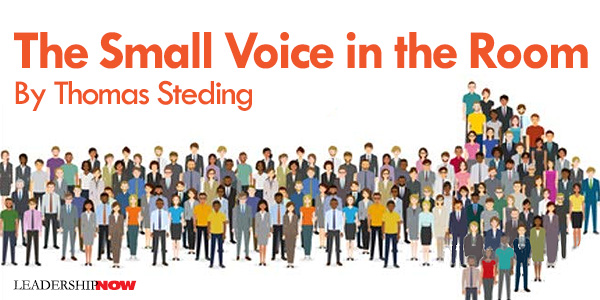
ONE OF THE MOST challenging leadership problems is to get people to speak up, especially as it concerns realizing the value of the “small voice in the room.” I had just come off my first CEO assignment with Pretty Good Privacy, Inc. a fairly notorious email encryption company both provoking concerns from the NSA but also putting privacy on the map as “the marketing gorilla of the Internet.” With this cybersecurity background, I was recruited to run another security company that had developed a clever computer card implementation of the emerging virtual private networking standard. With this impressive implementation, it had managed to enter into an agreement with a much larger, high-profile player in the industry. This partnership had the potential to put the startup on the map and create a high valuation for subsequent investment rounds. When I joined the company, it was late delivering the hardware/software card to the partner. While I was able to secure a $6M investment from the partner, they were at the same time giving me increasing levels of grief for the delays. I had already completed some training in company principles and was pressuring the team to follow through on the “honoring commitments” part of the practices I had put forward. I had also discussed the “speaking up” practice, but one thing at a time. Unfortunately. With this pressure on the team, it eventually delivered the card. The larger partner took three months to begin testing the card, during which further development of the card by the startup was suspended, finding it amusing that the partner who complained about our tardiness was even more tardy, soon to become a not so amusing lesson in avoiding smugness. Once testing began, the card crashed. Repeatedly. And despite a desperate effort to remedy the problem, it turned out to be irretrievably flawed. During the testing process with the larger partner, one of the startup engineers was heard to say “They should be mad. That card is junk!” Had that fact been widely understood, the startup company could have used those three months to fix the card and save the partnership. Unfortunately, with time running out, the partnership collapsed. Somebody on the team always knows about a problem before it is detected by some kind of oversight system. That is why real teams provide a sufficiently safe environment to encourage speaking up no matter what consequences otherwise might attend the act. Instead, another startup, employing a similar technology strategy, but running months behind, gained traction. It ultimately went public and ultimately was sold for $3 billion. The first startup eventually sold for $50 million, or a difference in outcome of $2.95 billion. That’s an expensive communication mishap. In the Greek Pantheon, Hermes was the god of complementarity and communication. He encouraged not only open pathways but also actions to fill them. We think of Greek gods as curious figures from the past. They aren’t. They are an embodiment of human nature, and we might be surprised to find they are alive and well and present in our conference rooms. In this case, Hermes wept. These and many other principles and practices are covered in my new book, Real Teams Win: What Smart Leaders Need to Know Now About Achieving Peak Performance.  
Posted by Michael McKinney at 01:03 AM
12.03.20

Leading Thoughts for December 3, 2020
IDEAS shared have the power to expand perspectives, change thinking, and move lives. Here are two ideas for the curious mind to engage with: Wright Thompson on doing the work: “More and more today, we don’t want to do the work or take the chances required for greatness, and we try to fix all those shortcuts on the back end with marketing and branding—modern, fancy words than mean lie.” Source: Pappyland: The Story of Family, Fine Bourbon, and the Things That Last Arsène Wenger on coaching: “The coach’s role is to make the player understand everything that serves the interests of the game. To do this, he must speak to the child within each player, to the adolescent he was and the adult he is now. Too often a coach tends only to speak to the adult, issuing commands for performance, victory, reflection, to the detriment of the child who is playing for pleasure.” Source: Wenger: My Life and Lessons in Red and White Look for these ideas every Thursday on the Leading Blog. Find more ideas on the LeadingThoughts index.
Posted by Michael McKinney at 12:01 AM
12.01.20

First Look: Leadership Books for December 2020Here's a look at some of the best leadership books to be released in December 2020. Don't miss out on other great new and future releases not listed here.
Smart new technologies. Longer, healthier lives. Human progress has risen to great heights, but at the same time it has prompted anxiety about where we're heading. Are our jobs under threat? If we live to 100, will we ever really stop working? And how will this change the way we love, manage and learn from others? One thing is clear: advances in technology have not been matched by the necessary innovation to our social structures. In our era of unprecedented change, we haven't yet discovered new ways of living. Drawing from the fields of economics and psychology, Scott and Gratton offer a simple framework based on three fundamental principles (Narrate, Explore and Relate) to give you the tools to navigate the challenges ahead. Both a personal road-map and a primer for governments, corporations and colleges, The New Long Life is the essential guide to a longer, smarter, happier life.
Highly respected Silicon Valley turn-around expert Thomas L. Steding presents his proven leadership process for achieving peak performance by accessing the untapped/unseen intelligence of deep imagination as well as the superior creativity and intelligence of the connected team. Thomas Steding has seen first-hand that the leadership skills that can take an organization from poor to peak performance and outdistancing its competition were not taught in business schools or management seminars or even a part of the leadership conversation. Real Teams Win is the culmination of Steding's four decades of high-impact methods that offer real change from within the organization with real results that work really fast.
Triumph over adversity using proven Special Operations habits and mindsets with this inspiring guide from retired Navy SEAL and New York Times bestselling author Jason Redman. Adversity can often catch you by surprise and leave you struggling with what to do next. What if you could confront any adversity, from the biggest challenges—the loss of your job, divorce, health issues, bankruptcy—to normal daily challenges—a late flight, a disappointing phone call, a missed promotion, a bad day—and not just survive it, but thrive afterwards?
What is it about the top tech product companies such as Amazon, Apple, Google, Netflix and Tesla that enables their record of consistent innovation? Most people think it’s because these companies are somehow able to find and attract a level of talent that makes this innovation possible. But the real advantage these companies have is not so much who they hire, but rather how they enable their people to work together to solve hard problems and create extraordinary products.
During the brutal crucible of Navy SEAL training, instructors often tell students to "embrace the suck." This phrase conveys the one lesson that is vital for any SEAL hopeful to learn: lean into the suffering and get comfortable being very uncomfortable. In this powerful, no-nonsense guide, Navy SEAL combat veteran turned leadership expert Brent Gleeson teaches you how to transform every area of your life--the Navy SEAL way. Embrace the Suck provides an actionable roadmap that empowers you to expand your comfort zone to live a more fulfilling, purpose-driven life. Through candid storytelling, behavioral science research, and plenty of self-deprecating humor, Gleeson shows you how to use pain as a pathway, reassess your values, remove temptation, build discipline, suffer with purpose, fail successfully, transform your mind, and achieve more of the goals you set
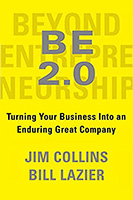  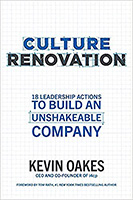
 Build your leadership library with these specials on over 28 titles. All titles are at least 40% off the list price and are available only in limited quantities. “Compare the difference between the life of a man who does no reading and that of a man who does. The man who has not the habit of reading is imprisoned in his immediate world, in respect to time and space. His life falls into a set routine; he is limited to contact and conversation with a few friends and acquaintances, and he sees only what happens in his immediate neighborhood. From this prison there is no escape.” — Lin Yutang, The Importance of Living
Posted by Michael McKinney at 12:10 AM
|
BUILD YOUR KNOWLEDGE


How to Do Your Start-Up Right STRAIGHT TALK FOR START-UPS 
Grow Your Leadership Skills NEW AND UPCOMING LEADERSHIP BOOKS 
Leadership Minute BITE-SIZE CONCEPTS YOU CAN CHEW ON 
Classic Leadership Books BOOKS TO READ BEFORE YOU LEAD |
|